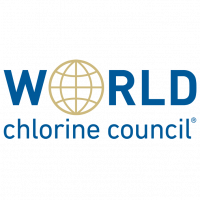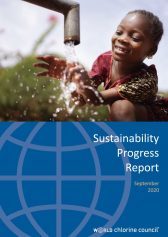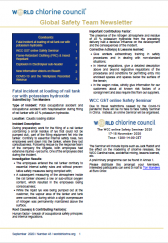| |
|
| |||
|
| |
Global News Update
|
|
| |
Contents
|
|
| |
Managing WCC in COVID-19 times
Dear colleagues and friends, As the autumn takes hold here in Europe, I would like to take the opportunity to update you on the highlights this year within the World Chlorine Council (WCC). Euro Chlor only has a few more months until we hand over the governance of the Secretariat at the end of this year. This year has been challenging for WCC with the cancellation of our opportunities to connect face-to-face due to the COVID-19 virus. On the other hand, chlorine chemistry has been called upon by authorities in our various regions to help protect people and medical professionals around the world as you can read here and in our regional snapshots below. As you can read below, we had a fruitful WCC Management Committee Spring Meeting on 30 March 2020 (instead of Dallas, Texas as originally planned) and I look forward to connecting with you all again in a few weeks to follow up on all our key topics at our virtual 2020 Annual Meeting on 20 October and again on 22 October 2020 (instead of Wroclaw, Poland, as originally planned). I truly hope we will get the chance to meet again in person in 2021! Warm regards, Marleen |
|
| |
WCC Management Committee Spring Meeting OverviewThe WCC Management Committee has held two fruitful meetings this year - the first a two-hour telephone conference along with the Global Advocacy & Science Team (GAST) on 30 January 2020 to update on progress between the two main bi-annual meetings (the Spring Meeting and Annual Meeting). |
|
|
|||||
|
|||||
| |
Regional snapshotsIn the runup to the WCC Annual Meeting on 22 October, WCC regions provided snapshots of their recent work.North America The U.S. Environmental Protection Agency’s (EPA) draft risk evaluation of asbestos was released in March. There were errors in EPA’s analysis of the data provided by the chlor-alkali industry that CCD highlighted. In rail transportation, shipper organisations continue to challenge the railroads’ attempts to impose tank car standards and limit competition in the rail market. The EPA is continuing its review of asbestos use in chlor-alkali production. CI provided written and oral comments. EPA is also moving forward with reregistration of chlorine and sodium hydroxide as pesticides, in two separate efforts. CI will be asking for clarification. Finally, EPA has announced a decision not to regulate perchlorate in drinking water. This action is being challenged by the Natural Resources Defense Council (NRDC), an NGO. In the transportation area, the railroads continue to attempt to assert control for specifications and rules for which the federal government has responsibility and authority. Rail transportation remains a key threat and, therefore, continues to be an area of focus for CI. In Brazil, a new law on universal sanitation by 2030 was approved. It is predicted that 40% of the actual chlorine capacity of the country will have to be expanded to comply with the chlorine needs for disinfection and PVC pipelines and connections. Also at the AGM, Euro Chlor elected its new Chairman and launched its annual review of European chlor-alkali. The problems with the bulk rail transportation of liquid chlorine with railcars or tank-containers continue. RusChlor specialists have participated in finalising the tank-container construction design and the liquid chlorine loading/unloading technology to be applied in the tank container. One of RusChlor's key tasks is to support member companies with information about available equipment and technologies at its annual International Scientific-and-Technological Conference. Due to COVID-19, this year's conference has been rescheduled to later this year or early next year.
AMAI organised three webinars for members on trends and forecast on the impact of COVID-19 on the industry. More virtual meetings have been held to discuss issues relating to plant operations and safety. Environment: CCAIA organised a workshop on environmental protection for chlor-alkali companies and a webinar with CPCIF on "Technical Guidelines for the efficient Application of low mercury catalysts in the calcium carbide method PVC industry". Conference: The national caustic soda industry technical annual meeting was held in Chongqing in July 2020 to exchange views on economic operations, technological developments and operation management experience. The rainy season continued for a long time and in August suddenly the hot season started. |
|
|
| |
|
| |||
|




